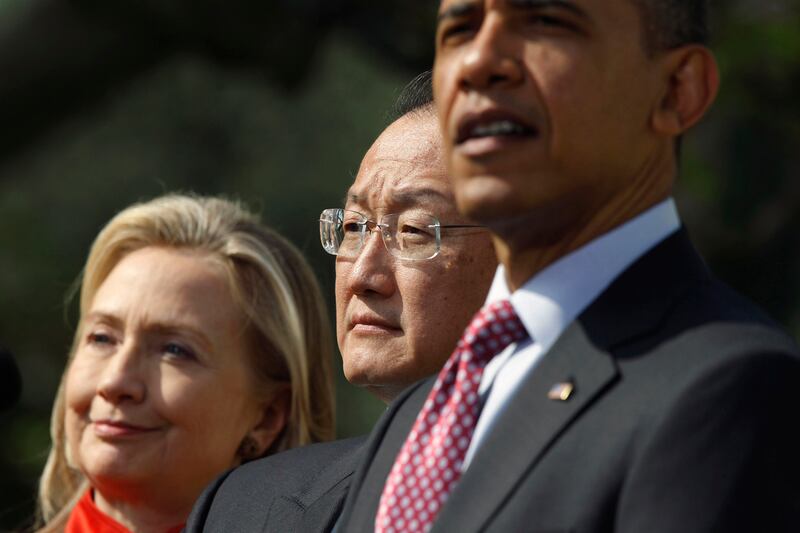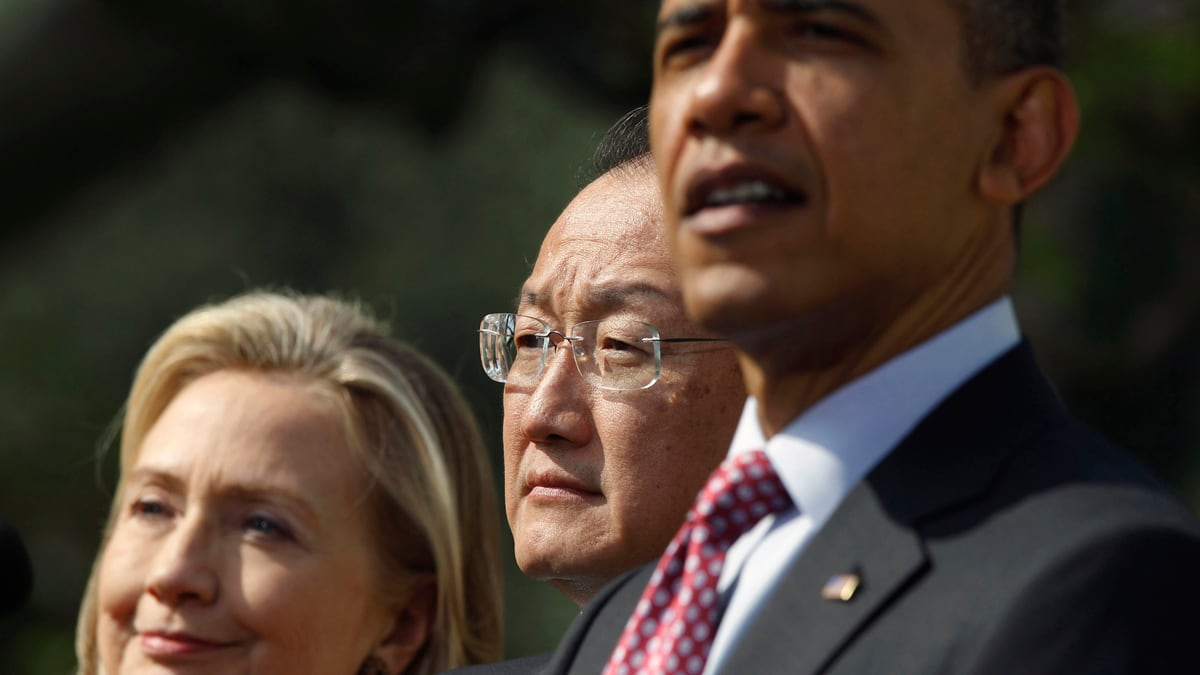Yesterday, President Obama announced his nomination for the next president of the World Bank, and the choice came as a surprise to almost everyone. Unlike recent heads of the bank—from Paul Wolfowitz, whose tenure was cut short by a minor scandal, to Robert Zoellick, who is now retiring, to the rather august James Wolfensohn—Dr. Jim Yong Kim is neither a power player in Washington nor a well-known political figure globally. Nor is he a banker of repute. He is instead a major figure in international aid circles, a founder of the health-care organization Partners in Health, a former leader of the World Health Organization’s initiatives to combat HIV/AIDS, and most recently, the president of Dartmouth University.
Given the history of the bank, Dr. Kim is a startling and dramatic departure, likely for the better. As many have noted, the World Bank presidency has traditionally gone to an American, while the head of the other major international aid organization, the International Monetary Fund, has been a European. Kim is American, but he was born in South Korea, and he hardly fits the typical profile of past bank presidents.
The World Bank and the IMF were created from the ashes of World War II as part of the same Bretton Woods system that enshrined the American dollar as the primary global reserve currency. The World Bank Group is actually a collection of five organizations, all of which are focused on the goal of global poverty alleviation, trade promotion, and economic development, and all of which provide loans to countries and institutions throughout the world.
ADVERTISEMENT
Noble goals, but in the latter decades of the 20th century, the bank was harshly criticized as being a handmaiden for U.S. control of the developing world and for imposing free-market templates that often caused sharp disruptions and social upheaval rather than growth and development in regions as far afield as Russia, Central America, and sub-Saharan Africa. For much of the 20th century, the bank was seen as imposing an economic orthodoxy as the price of its billions in aid, and there was undeniably a paternalistic quality of the wealthy nations granting aid to the poorer nations with multiple strings attached. You can have a loan, the bank seemed to say, as long as you do things our way.
While the image of the bank, as well as its actual practices, has shifted in recent years, until recently, it was as much an institution in tension with the likes of Dr. Kim as in harmony. It was in part a response to the controversial success—or depending on your perspective, manifest failures—of the bank and other international aid organizations, that Kim, then a medical student at Harvard, along with Paul Farmer and Roald Dahl’s daughter Ophelia and several others, created Partners in Health in 1987. Its first mission was to provide quality health care in Haiti, which was then recovering from years of the dictatorship of Jean-Claude “Baby Doc” Duvalier. Partners in Health was set up to focus on grassroots actors and empower people to meet their own needs, rather than looking to and depending on global aid organizations. Kim was a central part of the organization as Partners expanded its efforts in Latin America and Africa, especially Rwanda.

The grassroots approach was in sharp contrast to the top-down diktats of the World Bank in past years. It also was in contrast to the burgeoning and ballooning bureaucracy of the bank, which may not have rivaled the U.N. in its quantity of factotums, but still has swelled to more than 10,000 employees. That will be a challenge for Kim, who has not managed an organization of comparable size and complexity. Which may be a strength; Kim is beholden only to his vision of how best to solve the Rubik’s Cube of global development rather than to bureaucratic politics. But cumbersome institutions have a way of defeating the best intentions of energetic reformers, something which Kim surely knows, but will still have to overcome.
Obama has clearly made a bold, unorthodox choice. In Dr. Kim, he has embraced a vision of the bank as an agent of positive change in the world; as a source of funds and ideas, but with an eye toward enabling local communities to determine their own arc.
Dambisa Moyo, a noted critic of the paternalistic and corrupt nature of far too many international aid programs, sees Kim as an inspired pick. “Jim Kim has earned a solid reputation for balancing common sense and practical developing-country experience, with academic knowledge,” she told me. “I look to him to be well-reasoned and innovative in his approach; exactly what the emerging world needs.”
Assuming his appointment is approved by the World Bank, Kim will be a rare entrant into the ranks of global leadership, someone who built a career less by navigating the halls of power than by focusing on work that he believed needed doing. Obama, who may see himself in similar terms, obviously identified with those qualities. Yet like Obama, Kim will face a much more complicated task running the bank than he has in his professional life so far, and that lack of experience may undermine his ability to infuse the institution with a new vision for the connection between wealthier countries, aid, and sustainable global growth. For now, his appointment stands as a bright moment for Obama and for the world. Now comes the hard part.






